Small Business Advertising Spending
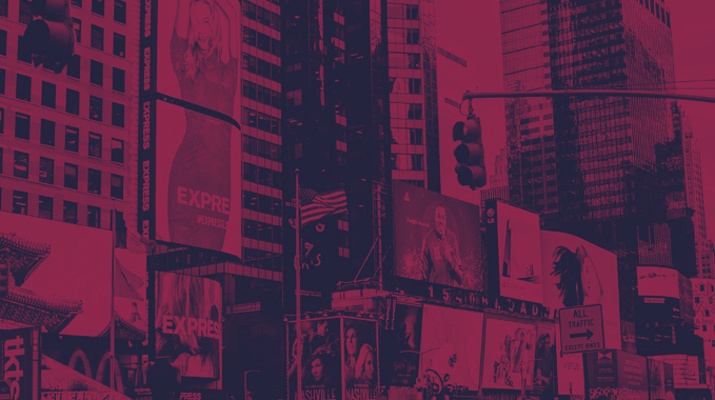
Small Business Advertising Spending
Most small businesses will increase spending on advertising in 2019, according to our survey of 529 small business owners and managers. Businesses will spend more on digital advertising such as social media and Google search, which helps achieve their goal of increasing sales and revenue.
Nearly all small businesses advertise (87%), and 67% plan to begin using a new advertising medium in 2019.
Advertising is part of most small businesses’ annual budget, but do businesses truly see it as a worthy investment?
The Manifest surveyed 529 small business owners and managers from across the U.S. about their advertising spending, if they plan on increasing this spending, and what mediums they plan to spend more on in 2019.
We define small businesses as having limited revenue and between 1 and 500 employees, which corresponds to the Small Business Administration's definition of small business.
Businesses can use this report to help plan their advertising budget and discover what advertising mediums can help them achieve their goals.
Our Findings
- One-third of small businesses (37%) spend less than $10,000 on advertising, which shows that businesses don’t have to spend a lot of money to have a successful advertising strategy.
- Millennial-owned small businesses tend to spend more on advertising: 61% of millennials spend more than $50,000 on advertising, compared to 36% of Generation Xers and 15% of baby boomers.
- Nearly all small businesses (91%) plan to increase their advertising spending in 2019, indicating that small businesses prioritize advertising and see it as a beneficial marketing strategy.
- The top advertising mediums small businesses plan to spend more on are social media (56%) and online (41%) such as Google search and banner ads, which offer more targeting opportunities than traditional mediums.
- Millennials are more likely than older generations to increase their advertising spending on both digital and traditional mediums, including social media (62%), online (49%), and TV (29%).
- Small businesses’ main goal for advertising is to increase sales and revenue (32%).
- Small businesses find that social media (43%) is their most effective medium for achieving their advertising goals, which range from increasing sales and revenue to converting leads to customers to standing out from competitors.
Small Businesses Have Small Advertising Budgets
Businesses don’t have to spend a lot to advertise successfully.
More than one-third of small businesses (37%) spend less than $10,000 on advertising each year.
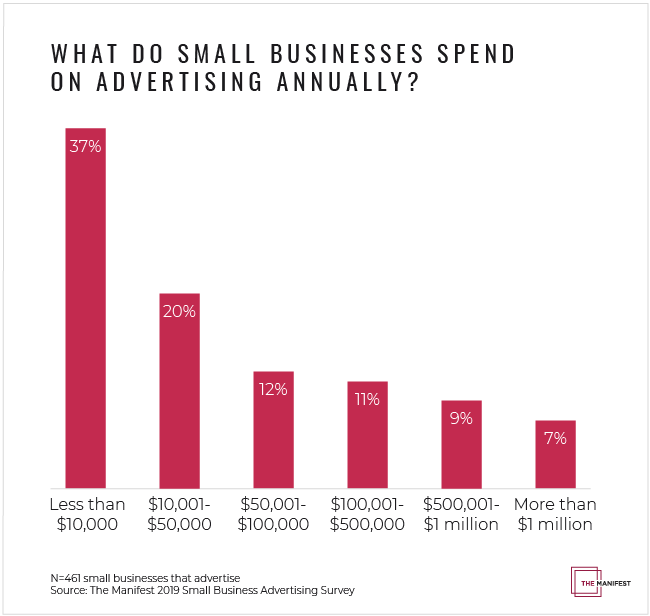
A smaller percentage of small businesses (20%) spend between $10,001 to $50,000 on advertising. Just 7% spend more than $1 million annually on advertising.
This advertising spend is small compared to some of America’s largest companies, such as Disney, AT&T, and Procter & Gamble, which annually spend more than $2 billion on advertising.
The right advertising budget varies by business needs and market. However, experts agree that businesses of all sizes should spend some of their overall budgets on advertising.
“I would not go below 2%, but it really depends on what the business is, what its competition is, and how unique its proposition is,” said Tim Smith, director of communications and media planning at IPNY, an advertising agency in New York. “If small businesses don’t advertise in some way, their chances of succeeding are very limited.”
If small businesses don’t advertise in some way, their chances of succeeding are very limited.
Small businesses need to allocate an advertising budget that works for their needs. This can range from a new business spreading brand awareness to a well-known company trying to capture new leads. Small businesses, both new and established, can benefit from advertising.
Businesses can work with an advertising agency to figure out the right advertising spending for them.
Millennials Spend More on Advertising for Their Small Businesses
More millennial small business owners view advertising as a worthy investment than older generations.
Sixty-one percent (61%) of millennial-owned small businesses (ages 18 to 34) spend more than $50,000 on advertising, compared to 36% of Generation Xers (ages 35 to 54) and just 15% of baby boomers (ages 55 and older).
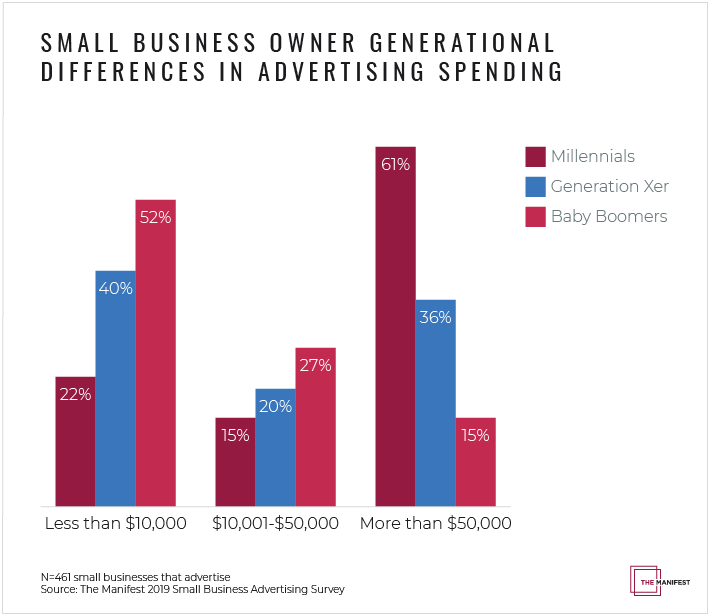
On the other hand, 52% of baby boomers spend less than $10,000 on advertising, 40% of Generation Xers, and 22% of millennials.
The younger generation sees advertising as a way to achieve their small businesses’ goals. Millennials are also more likely to find advertising both influential and trustworthy as consumers, which translates to how they advertise as business owners.
“Millennials understand that they have to really invest in marketing and advertising to be successful,” Smith said. “Older people tend to look at advertising as an expense and an obligation. Younger people tend to look at it as an investment and an opportunity.”
Some Generation Xers and baby boomer business owners feel obligated to invest in advertising but don’t have a desire to improve their advertising strategies. Smith said that millennials, on the other hand, see advertising as a strategy that can help them achieve their goals and are always looking for ways to improve it.
Matthew Ross, a millennial and co-owner and chief operating officer of sleep and mattress review website The Slumber Yard, credits advertising as one of the reasons his company exceeded $2.5 million in revenue last year.
The Slumber Yard’s YouTube advertisement below promoted mattress deals for President’s Day.

The Slumber Yard’s advertisement increased website traffic and spread the word about its brand.
“For us, it’s simple – advertising drives traffic to our website, which makes us money,” Ross said. “At the very minimum, advertising drives brand awareness, which will hopefully lead to a revenue transaction later down the road.”
Millennial-owned businesses such as The Slumber Yard understand the importance of advertising in increasing awareness, moving customers down the sales funnel, and earning revenue.
Nearly All Small Businesses Will Increase Advertising Spending in 2019
Small businesses may have small advertising budgets, but most are prioritizing advertising this year – nearly all (91%) will increase their spending on advertising in 2019.

Consumers encounter many new businesses via advertising.
For example, luggage company Away grew its brand from advertising on social media, such as with the Facebook advertisement below.
Away’s advertisements spread word about the business and also increased its word-of-mouth marketing. Away now accounts for 16% of total luggage revenue, ahead of other popular luggage brands such as Samsonite and Tumi.
Small business owners can learn from Away’s success and launch a successful business with advertising.
“It really is critical to advertise and get your name out there because otherwise, you get lost,” Smith said. “There’s too much noise going on these days not to advertise.”
Small businesses see the importance of allocating more of their budget to advertising and realize that if they don’t advertise, they risk becoming lost among their competition.
Moriarity’s Gem Art, a luxury jewelry store in Chicago, spent $20,000 on advertising last year and plans to double it in 2019.
The business advertises on various mediums but focuses its targeting on people who live within 20 miles of its brick-and-mortar location.
This Facebook advertisement targeted people in Chicago who were likely familiar with the Crown Point Square area.

Moriarity’s Gem Art used this Facebook ad to reach more people in its target market of Chicago.
“Advertising allows us to go after markets and potential customers we wouldn’t have been able to otherwise, which will help increase our brand awareness and overall sales in the area,” Marketing Manager Jeff Moriarity said.
Moriarity’s Gem Art uses advertising to stand out among the competition and reach potential customers in the Chicago area, which is why the business plans to double its advertising spending this year.
Small businesses see the benefits of advertising and are budgeting more for it in 2019.
Small Businesses Prioritize Advertising Spending on Digital Mediums
Small businesses value digital advertising and plan to spend more on these mediums in 2019 and in the future.
Fifty-six percent (56%) of small businesses will spend more on social media advertising, and 41% will spend more on online advertising such as Google search, banner, retargeted, and video advertisements this year.
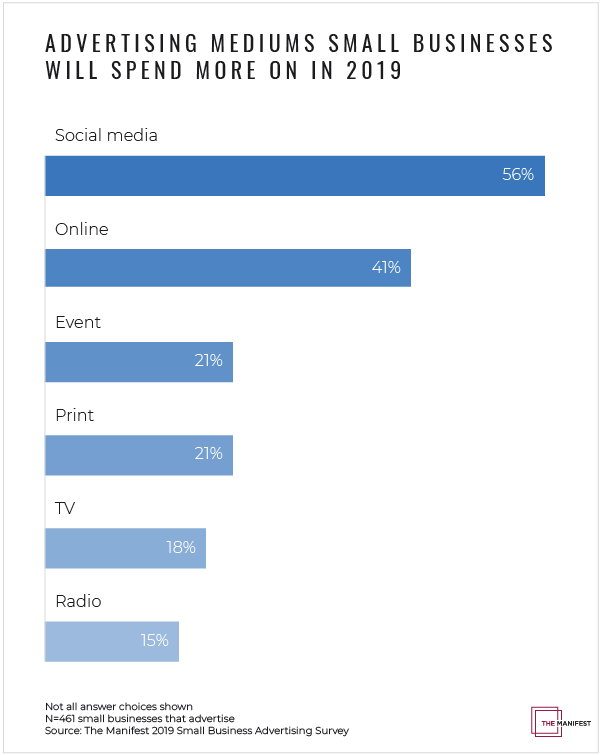
Small businesses will increase spending on digital advertising because it’s easy to reach a specific target audience on these mediums.
For example, small businesses can set up Custom Audiences on Facebook, which allows their advertising to reach only those who are already familiar with their business. This includes those who like a business’s page or have previously interacted with a business’s content.
Small business can also advertise on Google – 75% of people say paid search ads make it easier to find the information they are searching for on a search engine. People shop using social media and search platforms, so it’s important to reach people with online advertising.
“Digital advertising reflects the way people shop today, which is online, and offers targeting opportunities that weren’t possible before,” said Harry Chapin, CEO and founder of Forge Worldwide, a brand-building company in Boston.
Digital advertising reflects the way people shop today … and offers targeting opportunities that weren’t possible before.
Before online advertising, businesses focused their efforts on traditional advertising mediums such as TV, print, and radio. Although businesses could choose to advertise during a specific TV show, in a special interest magazine, or during a certain radio show, they could not target only people who were likely to convert. These advertisements likely reached many people who were out of their target audience.
With digital advertising, businesses can target only the people who are likely to make a purchase based on demographics such as age, gender, location, interests, and more. This ensures money isn’t wasted on reaching people who are unlikely to convert.
For a business like The Greater Fort Lauderdale Convention & Visitors Bureau, Facebook Custom Audiences helped it target people searching for flights and hotels. Its Facebook ads resulted in a 52% increase in flight searches to Fort Lauderdale and a 36% increase in hotel searches.
SellMax, a company that buys people’s used cars, is increasing its advertising spending this year on online mediums, rather than traditional.
For example, on Facebook, SellMax advertises its brand mission: buying and selling cars quickly.

Facebook and other online advertisements tend to result in better returns for SellMax because online mediums allow it to hone in on the individuals it wants its message to reach.
“We’ve tried bus benches, billboards, print, and Yellow Pages, but nothing comes close to the ROI we are able to extract from online advertising,” Marketing Manager Sean Pour said. “I believe a major drive for that is the fact that we are able to more closely target specific demographics when advertising online. In print and other forms of advertising, it is harder to do so.”
SellMax uses online advertising to target people who are more likely to want to sell their car quickly, such as students or people who move often.
Digital advertising is more successful than traditional advertising at helping SellMax target specific demographics. This is why SellMax, like other small businesses, is focusing its advertising spending on digital mediums.
Millennial Small Business Owners Will Increase Spending on Advertising in 2019
Nearly every generation of small business owners plans to spend more on advertising for their business in 2019.
About 94% of millennial-owned businesses will increase spending on advertising, 92% of Generation Xers, and 84% of baby boomers.

Millennial small business owners, however, are more likely to increase spending across advertising mediums, both digital and traditional.
More millennials will increase spending on social media (62%) than both Generation Xers (58%) and baby boomers (45%).
In addition, about 49% of millennials will spend more on online advertising, compared to 41% of Generation Xers and 30% of baby boomers.
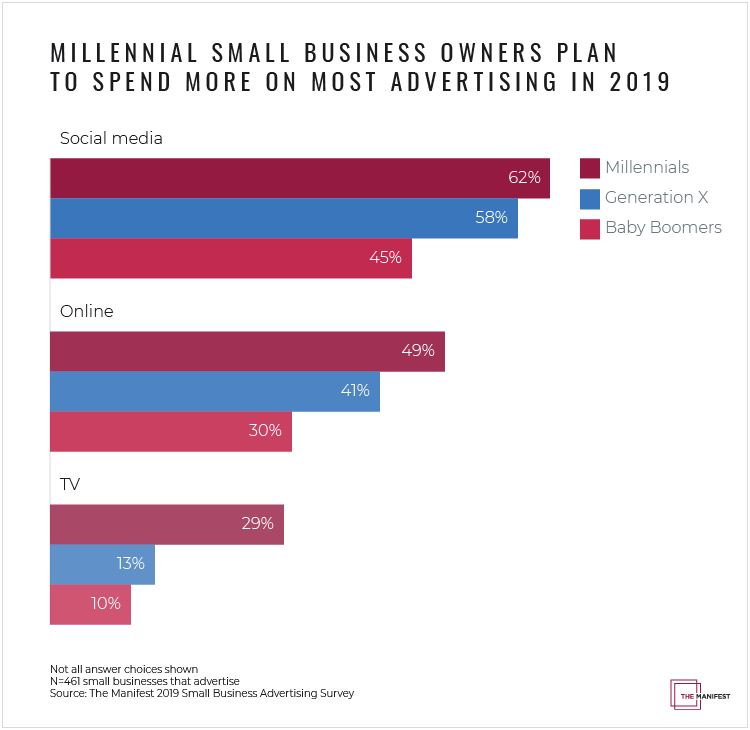
Millennials will also increase spending on traditional mediums. Nearly one-third (29%) will spend more on TV advertising in 2019 – more than Generation Xers (13%) and baby boomers (10%).
The millennial generation grew up surrounded by both traditional and digital advertising mediums. They have been in the position to see an ad on Facebook, Instagram, or Google and convert. This personal experience makes them more open to the idea that advertisements work for businesses.
“The younger generation thinks that’s what they need to do to make their business successful because that’s how they have discovered businesses,” said Josh Ryther, senior partner at Deksia, a marketing strategy and brand development agency in Michigan. “It’s the world they’ve grown up in, and they’ve seen other businesses be successful that way.”
Millennials have seen businesses succeed on different advertising mediums, which is why they plan to increase spending on advertising across the board.
Southern Designs, a company that sells metal signs through its website Metal Unlimited, will increase its advertising spending by $1 million this year. The business is owned by millennial Tance Hughes, who was featured on Forbes 30 Under 30 list in 2018.
Southern Designs uses social media advertising to retarget people who have visited its site and reach people who are likely to be interested in its products.
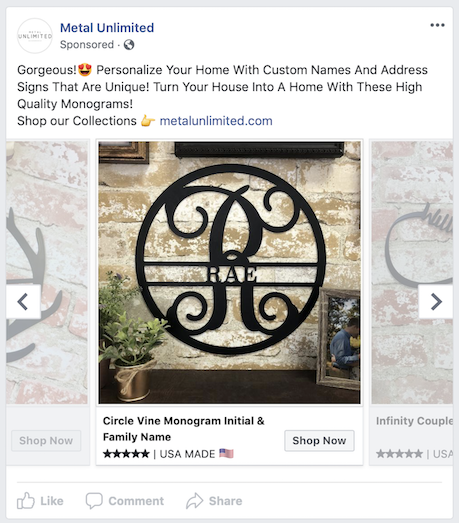
Southern Designs relies on social media and other online advertising to build its brand name.
“Advertising not only increases sales but [also] helps us build our brand for the long haul by increasing brand recognition and solidifying ourselves as the leader in our product category,” Hughes said.
Hughes will focus most of his advertising spending on Facebook and Google Ads and will begin investing in YouTube and display advertising.
Millennial small business owners see the importance of advertising and plan to spend more on advertising to spread brand awareness.
Advertising Helps Small Businesses Increase Sales and Revenue
Although advertising costs money, it ultimately helps small businesses make money in the long-run.
Around one-third of small businesses (32%) say that increasing sales and revenue is their main goal for advertising, which shows they recognize the value of dedicating part of their marketing budget to advertising.
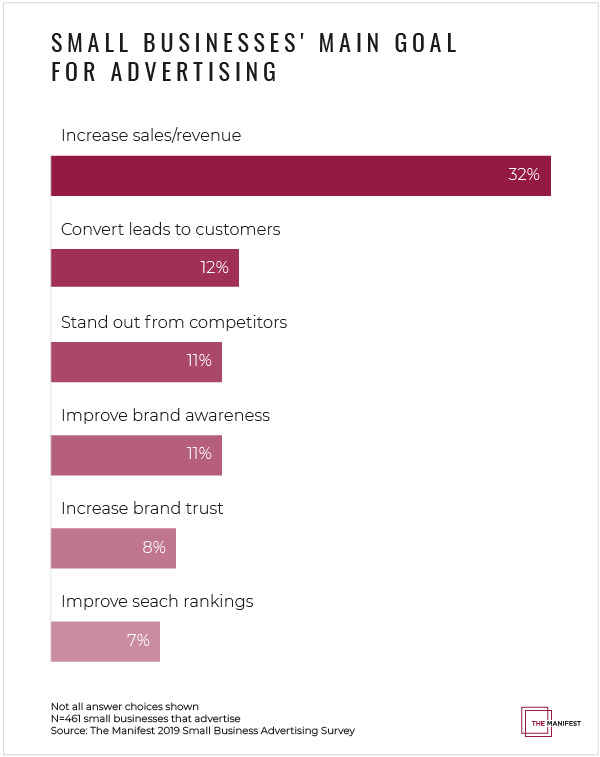
Small businesses can increase sales by spreading brand awareness and increasing customer engagement – both of which advertising can help accomplish.
“The goal of advertising is to simply create brand recognition for small businesses in order to increase brand engagement and overall sales,” said Les Kollegian, CEO of Jacob Tyler, a brand experience agency in California. “If done properly, consumers will become brand loyalists and even share their experience with friends, thus lowering a company’s cost of client acquisition.”
Businesses can capture a target audience of future repeat customers with advertising. As potential customers are exposed to the same businesses’ ads repeatedly, they’re more likely to make a purchase from the brand and perhaps even become loyal customers.
For example, Hughes, of Metal Unlimited, uses advertising to build his brand.
“Advertising not only increases sales but [also] helps us build our brand for the long haul by increasing brand recognition and solidifying ourselves as the leader in our product category,” he said.
A successful advertising strategy helps small businesses spread word of their brand and stand out among the competition, which leads to increased sales and revenue.
Social Media Is Most Effective Advertising Medium for Small Businesses
One of the newest advertising mediums is the most successful at achieving the goals small businesses have for advertising: social media.
Nearly half (43%) of small businesses say social media is their most effective advertising medium.
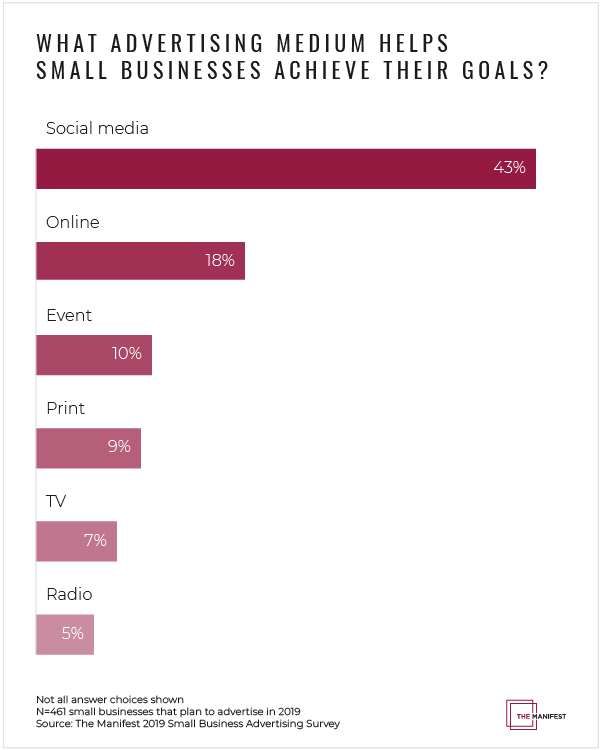
Online advertising is second-best at achieving small businesses’ advertising goals, but just 18% say so.
Most people regularly use social media, and 30% interact on social media more than 10 times per day. Small businesses understand the need to advertise on social media to reach these consumers.
“Social advertising really is the most efficient advertising vehicle for [small businesses] to use,” said Dan Collins, chief strategy officer at GKV, a full-service digital agency in Baltimore. “Traditional mediums like TV and radio have such broad targeting. With social, you can target a very particular niche. This will help you reach your goals and have more effective advertising.”
Social advertising really is the most efficient advertising vehicle for [small businesses] to use.
Advertising on social media helps businesses target and reach people where they are – on Facebook, Instagram, Twitter, Pinterest, and more.
Brandon Webb, founder of Hypluxe, a sneaker reseller, is prioritizing social media advertising this year because of its ability to target people easily.
For example, Hypluxe’s Instagram Story ad targets people who are interested in fashion and athletic wear.

Webb said that this targeting provides more effective results than what was possible before social media advertising.
“Advertising on social media puts our brand directly in front of the people who will be interested in it most,” Webb said. “Facebook and Instagram have become some of the easiest and most effective platforms to advertise on.”
Small businesses such as Hypluxe use social media advertising to reach interested consumers, who are most likely to make a purchase.
Social media advertising is effective at increasing businesses’ sales and revenue.
Advertising Is a Worthy Investment for Small Businesses
Small businesses may have small budgets, but they should allocate some spending every year toward advertising.
Businesses value spending on a variety of advertising mediums but will prioritize digital mediums in 2019, which help them achieve their goals more than traditional mediums.
Advertising helps small businesses spread brand awareness and reach consumers and, as a result, increases their sales and revenue.
About the Survey
The Manifest surveyed 529 small business owners and managers at companies in the U.S. with fewer than 500 employees.
Fourteen percent (14%) of respondents’ businesses have 1 employee; 40% have 2 to 10 employees; 24% have 11 to 50 employees; 15% have 51 to 250 employees; and 7% have 251 to 500 employees.
Fifty-two percent (52%) of survey respondents are male; 48% are female.
Twenty-nine percent (29%) of respondents are millennials (ages 18-34); 45% are Generation X (ages 35-54); and 27% are baby boomers or older (ages 55+).
Respondents are from the South (44%), Northeast (20%), Midwest (18%), and West (18%).


